11 Jul 17 | Digital Freedom, Europe and Central Asia, Mapping Media Freedom, News and features, Ukraine
[vc_row][vc_column][vc_column_text]
Alongside the digitalisation of journalism comes the increasing danger of cyber-attacks on media workers. Reporters in Ukraine have faced a string of such attacks recently, including cyberbullying, the blacklisting of websites and ransomware viruses, as reports to Index on Censorship’s Mapping Media Freedom project show.
“Online threats have become increasingly prevalent throughout Ukraine, and the climate of impunity that exists within the country prevents these cases from being taken seriously,” Hannah Machlin, the project manager at Mapping Media Freedom, said. “Index calls upon the Ukrainian authorities to investigate instances of online harassment more thoroughly and hold offenders accountable.”
Machlin urges Ukraine to “adhere to European press freedom standards by ceasing to censor the media, including pro-Russian websites”. Furthermore, she urges both the Ukrainian government the international community to “increase investments in digital security efforts”.
Hromadske TV journalist Nastya Stanko was the victim of a cyberbullying campaign. The harassment began on 10 June when Stanko received official thanks from Ukrainian Ministry of Defense “for significant contribution to the development of national war journalism”.
Katya Gorchinskaya, Hromadske TV executive director, claimed that the campaign against Stanko was a clear example of anonymous cyberbullying. “It’s not just a campaign against Stanko, this is just one example of harassment against journalists doing their work,” Gorchinskaya told Detector Media. “We saw many similar incidents last year, and this persecution is not only against those who spoke and wrote about the situation on the frontline, but also those who were writing about corruption in governance. Hromadske TV, Radio Liberty, Ukrayinska Pravda, Novoe Vremiya, OCCRP and all investigative journalists in general – they all suffer from such harassment.”
On 19 June, the Ministry of Information Policy released a list of 20 websites that it plans to ban, many of which are considered to be pro-Russian. These are: rusvesna.su, rusnext.ru, news-front.info, novorosinform.org, nahnews.org, antifashist.com, antimaydan.info, lug-info.com, novorossia.today, comitet.su, novoross.info, freedom.kiev.ua, politnavigator.net, odnarodyna.org, zasssr.info, ruspravda.info, on-line.lg.ua, ruscrimea.ru, c-pravda.ru and 1tvcrimea.ru.
According to the ministry, this list was compiled by experts and was sent to the Security Service of Ukraine. It believes that these websites violate Ukrainian legislation by fuelling ethnic and interethnic hostility, calling for the overthrow of the constitutional system, violating the territorial integrity of the country and violating legislation on decommunisation.
This comes after a 15 May decree by Petro Poroshenko, the country’s president, that bans a number of Russian media and social media websites including VKontakte and Odnoklassniki along with the search engine Yandex and the email service Mail.ru.
On 30 June Ukrainian news websites Korrespondent.net and Komsomolskaya Pravda were blocked for three days as a result of a ransomware attack known as Petya. A message on Korrespondent.net read: “Dear visitors, the site’s work was blocked by a massive virus attack. Our team is currently working hard to resume its work in the near future.”
According to Ukrainian police, 1,508 companies and individuals filed complaints about computers being locked by the Petya virus, which encrypts data on a computer and demands a ransom to release access. The attack is assumed to be a part of the 27 June large-scale hack which began in Ukraine, targeting the government, banks, enterprises and media outlets. Attacks also took place in Italy, central Europe, Israel, Germany and Russia.[/vc_column_text][/vc_column][/vc_row][vc_row][vc_column][vc_column_text]
Mapping Media Freedom
Click on the bubbles to view reports or double-click to zoom in on specific regions. The full site can be accessed at https://mappingmediafreedom.org/[/vc_column_text][/vc_column][/vc_row]
10 Jul 17 | Index in the Press
Human rights defender Nabeel Rajab has been sentenced to two years in prison in Bahrain for “broadcasting fake news”. Read the full article
10 Jul 17 | Bahrain, Bahrain Statements, Campaigns, Campaigns -- Featured, Statements
[vc_row][vc_column][vc_column_text]The sentencing of Nabeel Rajab, an Index Freedom of Expression Award winner for his work defending human rights in Bahrain, underscores the decline of freedom of expression in the Gulf country.
Rajab was sentenced on Monday 10 July to two years in prison for speaking to journalists.
“The decision to sentence Nabeel to two years in prison reiterates the draconian approach Bahrain’s government takes toward non-violent dissent. This is a true miscarriage of justice that strips bare even the veneer of legality that Bahraini authorities like to show the rest of the world. Nabeel expressed opinions about the state of his own country and should not be penalised for free speech,” Melody Patry, head of advocacy at Index on Censorship, said.
Rajab, who is president of the Bahrain Center for Human Rights, was sentenced in absentia. He has been hospitalised since April.
Arrested on 13 June 2016, Rajab has spent the last year in pre-trial detention, largely in solitary confinement and deplorable conditions.
Rajab also faces trial on 7 August in a separate case related to his tweeting against the Saudi coalition’s war in Yemen, which Bahrain is part of, as well as speaking out against torture in Bahraini prisons. He faces up to 15 years in prison on other charges, according to the Bahrain Institute for Rights and Democracy.[/vc_column_text][/vc_column][/vc_row][vc_row][vc_column][vc_single_image image=”94125″ img_size=”full”][vc_basic_grid post_type=”post” max_items=”12″ style=”load-more” items_per_page=”4″ element_width=”6″ grid_id=”vc_gid:1499705443530-4f8668e7-7a47-7″ taxonomies=”3368, 716″][/vc_column][/vc_row]
10 Jul 17 | Asia and Pacific, Campaigns -- Featured, China, Statements
[vc_row][vc_column][vc_column_text]Update: On 13 July 2017 the Chinese Nobel Peace Prize winner Liu Xiaobo, jailed for his pro-democracy work, died in hospital aged 61.
Chinese Nobel Peace Prize laureate and writer Liu Xiaobo, who was imprisoned since 2009 for calling for more freedom in his country, has been diagnosed with terminal liver cancer. He was recently released into hospital for treatment and his state of health is considered critical.
Index calls on the UK government to urge China to release Liu immediately and allow him to travel abroad for treatment. It also calls on the UK ambassador to visit Liu and his wife the poet Liu Xia in the hospital. In the past few days, Liu has reiterated his request to be able to travel to have medical treatment.
Liu’s friends and journalists report trying to visit the couple in the hospital and being beaten by police.
In December 2008, Liu co-drafted Charter 08, a document modelled on Václav Havel’s Charter 77, written in Communist Czechoslovakia 30 years earlier. The document outlines the basic principles and fundamental rights that should govern China’s political landscape including freedom of association. Over 350 intellectuals and activists initially signed it, with a further 10,000 people including academics, journalists and businessmen adding their names to it upon its release. The government’s reaction to Charter 08 was swift and harsh. Liu was initially arrested two days prior to its official publication and later charged with 11 years in prison for incitement to subversion, during a trial in which he said he had no enemies. Index has repeatedly called for his release.[/vc_column_text][/vc_column][/vc_row][vc_row][vc_column][vc_basic_grid post_type=”post” max_items=”4″ element_width=”6″ grid_id=”vc_gid:1499953076038-54c71786-d828-10″ taxonomies=”85″][/vc_column][/vc_row]
10 Jul 17 | Index in the Press
Human rights defender Nabeel Rajab has been sentenced to two years in prison in Bahrain for “broadcasting fake news”. A court ruled that he had undermined the “prestige” of the kingdom, the state news agency reports. Read the full article
10 Jul 17 | Artistic Freedom, News and features, Volume 46.02 Summer 2017 Extras, Youth Board
[vc_row][vc_column][vc_custom_heading text=”Members of Index’s youth board looked at three famous works that fell victim to the Russian censors”][/vc_column][/vc_row][vc_row][vc_column][vc_column_text]
The Summer 2017 issue of Index on Censorship magazine looks at the long-term consequences of 1917 Russian Revolution, which launched the global communist experiment, and the long-term impact that it had on free speech around the world. Here, three members of Index’s youth board give examples of works that failed to find favour with the authorities the revolution ushered in.
[/vc_column_text][/vc_column][/vc_row][vc_row][vc_column][vc_column_text]
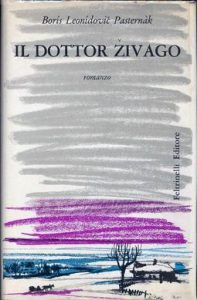
The original Italian edition of Dr Zhivago. Credit: Wikimedia
Dr Zhivago – Boris Pasternak
Isabela Vrba Neves (Stockholm)
A depiction of Russian life between the Bolshevik Revolution and World War II, Dr Zhivago (1957) by Boris Pasternak is a piece of literature presenting the reader with romance and the tragedies experienced by Russians during the early twentieth century.
Dr Zhivago tells the story of Yuri Zhivago, a man suffering hardship throughout his life, from becoming an orphan to being in love with two women and arousing the suspicions of those in power. Through an intricate plot introducing many characters, Zhivago witnesses the revolution and civil war, all while exploring questions of religion and philosophy.
Pasternak submitted his book for publishing in 1956 but was rejected in the Soviet Union due to it containing anti-Soviet passages and criticism of the Bolsheviks. As a result, the book was banned in the Soviet Union until 1988. However, in 1957 a manuscript was smuggled to Milan, where it was first published.
The following year Pasternak was awarded a Nobel Prize in Literature, which he had to turn down after being threatened with ejection from the Soviet Union. The award was later accepted in 1988 by his relatives.
A film adaptation of Dr Zhivago was released in 1965, starring the late actor Omar Sharif and Geraldine Chaplin. Immensely popular in Europe and North America, the film adaption was also banned for many years in the Soviet Union.
[/vc_column_text][/vc_column][/vc_row][vc_row][vc_column][vc_column_text]
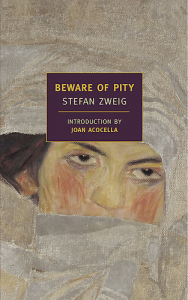
The cover of Stefan Zweig’s Beware of Pity. Credit: Wikimedia
The Collected Novellas of Stefan Zweig
Samuel Rowe (London)
As I was leaving a house on the outskirts of Copenhagen some summers ago, I was handed a bright orange hardback book. It was The Collected Novellas of Stefan Zweig. I was told that Zweig’s novel, Beware of Pity, had loosely inspired the 2014 Wes Anderson film The Grand Budapest Hotel and that Zweig’s works had been burned in the streets during the Third Reich. But this was not the first time his literature had been burned.
Not long before – 30 October 1929, to be precise – Krupskaia Lenin, wife of Vladmir, had sent out a circular to all librarians in the Soviet Union. It contained a list of literature considered decadent or which fostered “social pessimism”, and required they be removed from all public libraries. Zweig’s stories could have fallen into the former or the latter category; his stories were popular and hilarious, subversive and frank.
Once the procedure was completed, two copies of each title on the list were sent to the central library of each region, accessible only to qualified researchers.
[/vc_column_text][/vc_column][/vc_row][vc_row][vc_column][vc_column_text]
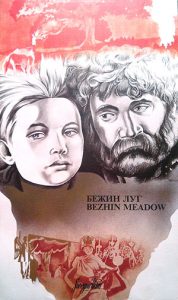
A poster for Bezhin Meadow. Credit: Wikimedia
Bezhin Meadow – Sergei Eisenstein
Sophia Smith-Galer (London)
One of the most famous films to have been scuppered by censorship in the Soviet Union was Bezhin Meadow, a film adaptation of the story Bezhin lug by Ivan Turgenev. The film, directed by Sergei Eisenstein, was believed to have been destroyed before its completion, but parts of it resurfaced in the 1960’s, allowing for a crude recreation.
The main character Ivan’s life story was based on the life of Pavlik Morozov, a young Russian boy who denounced his father to the Soviet Union and, ultimately, died at the hands of his family. It grew to become a story of political martyrdom after his death in 1932.
Sergei Eisenstein was nonetheless already a world famous film director – Battleship Potemkin (1925) is still used as an example of groundbreaking cinematography to this day – and is best remembered for pioneering the montage.
[/vc_column_text][/vc_column][/vc_row][vc_row][vc_column][vc_column_text]
This piece was written by members of Index on Censorship’s youth advisory board. You can find out more about the youth advisory board here
[/vc_column_text][/vc_column][/vc_row][vc_row content_placement=”top”][vc_column width=”1/3″][vc_custom_heading text=”100 Years On” font_container=”tag:p|font_size:24|text_align:left” link=”url:https%3A%2F%2Fwww.indexoncensorship.org%2Fnewsite02may%2F2017%2F06%2F100-years-on%2F|||”][vc_column_text]Through a range of in-depth reporting, interviews and illustrations, the summer 2017 issue of Index on Censorship magazine explores how the consequences of the 1917 Russian Revolution still affect freedoms today, in Russia and around the world.
With: Andrei Arkhangelsky, BG Muhn, Nina Khrushcheva[/vc_column_text][/vc_column][vc_column width=”1/3″][vc_single_image image=”91220″ img_size=”medium” alignment=”center” onclick=”custom_link” link=”https://www.indexoncensorship.org/newsite02may/magazine”][/vc_column][vc_column width=”1/3″ css=”.vc_custom_1481888488328{padding-bottom: 50px !important;}”][vc_custom_heading text=”Subscribe” font_container=”tag:p|font_size:24|text_align:left” link=”url:https%3A%2F%2Fwww.indexoncensorship.org%2Fnewsite02may%2Fsubscribe%2F|||”][vc_column_text]In print, online. In your mailbox, on your iPad.
Subscription options from £18 or just £1.49 in the App Store for a digital issue.
Every subscriber helps support Index on Censorship’s projects around the world.
 SUBSCRIBE NOW[/vc_column_text][/vc_column][/vc_row]
SUBSCRIBE NOW[/vc_column_text][/vc_column][/vc_row]
07 Jul 17 | Asia and Pacific, China, Digital Freedom, News and features
[vc_row][vc_column][vc_column_text]
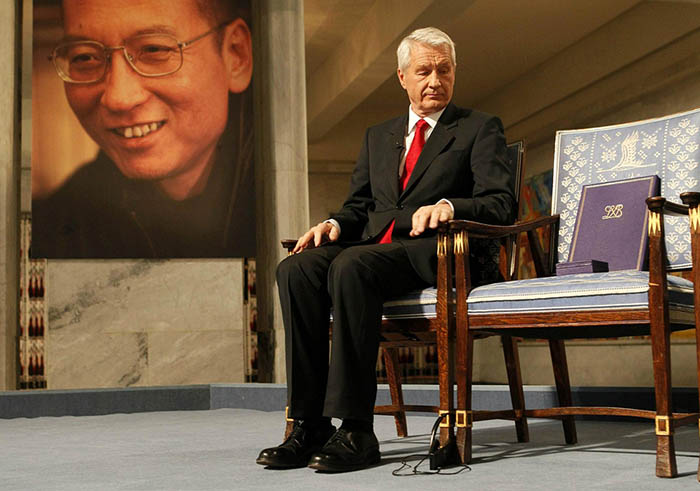
Chairman of the Norwegian Nobel Committee Thorbjoern Jagland sits beside the empty chair of Chinese dissident Liu Xiaobo during the ceremony to honour the 2010 Nobel Peace Prize winner. Credit: kunshou / Flickr
Update: On 13 July 2017 the Chinese Nobel Peace Prize winner Liu Xiaobo, jailed for his pro-democracy work, died in hospital aged 61.
When Liu Xiaobo was awarded the Nobel Peace Prize in 2010, Chinese authorities were sent into a state of panic. Liu had been in prison since 2009, following the release of Charter 08, a pamphlet he co-wrote that called for greater democratic freedoms. As the world’s attention was on China and on Liu, all references to Liu and the prize were blocked online and off. Then his wife and many of his acquaintances were detained in an attempt to stop them from going to Oslo and collecting it on his behalf. At the ceremony itself, an empty chair became a stark reminder of his absence and soon the words “empty chair” started to race through the internet. These too were blocked.
Liu has since remained in prison and efforts to stamp out his name continue. But last week he once again made headlines following his release from prison on health grounds. At the time of writing, reports say Liu, who is suffering from late-stage liver cancer, is close to death. For free speech advocates around the world, this news is saddening. No figure has come to represent the fight for Chinese democracy as much as Liu Xiaobo.
Born in 1955 in Jilin province in northeast China, the son of two teachers, Liu went on to become a writer, activist and academic. It was while teaching at Columbia’s Barnard College in New York in 1989 that the Tiananmen Square protests broke out. Liu decided to return to China to take part in them on their final, fateful day. This led to his arrest and imprisonment, the first of four times.
Liu was shunned by China’s academic community when he left prison two years later, but that did not silence him and he continued to build on his reputation within China as an outspoken critic of the Communist Party. He also started a tradition of writing poems about Tiananmen every year to mark the anniversary – a powerful reminder that the government does not have a monopoly on memory.
For Liu the internet was a lifeline. He described it as “God’s gift to the Chinese people” in an essay that was published in Index on Censorship magazine in 2006. The web became his primary portal to publish his thoughts to the outside world and to reach audiences when traditional forms of media were out of bounds. Liu wrote that “the effect of the internet in improving the state of free expression in China cannot be underestimated”.
Liu’s influence peaked in December 2008 with Charter 08, a document modelled on Václav Havel’s Charter 77, written in Communist Czechoslovakia 30 years earlier. The document outlines the basic principles and fundamental rights that should govern China’s political landscape. Over 350 intellectuals and activists initially signed it, with a further 10,000 people including academics, journalists and businessmen adding their names to it upon its released. The government’s reaction to Charter 08 was swift and harsh. Liu was initially arrested two days prior to its official publication and later charged with 11 years in prison for incitement to subversion, during a trial in which he said he had no enemies. Index has repeatedly called for his release.
Isabel Hilton, a leading expert on China, told Index back in 2010 that “when the history of free expression and freedom of ideas is written, he and the other signatories of Charter 08 will be remembered as courageous citizens who sought the best for their country”.
In an interview Liu gave prior to his arrest, he said: “The way I see it, people like me live in two prisons in China. You come out of the small, fenced-in prison, only to enter the bigger, fenceless prison of society.” Since Liu’s arrest almost a decade ago, China has continued to change at breakneck speed. When it comes to human rights and free speech, sadly this change has been predominantly for the worse. The bigger, fenceless prison that Liu spoke of is today a lot more closed and draconian. China’s current leader, Xi Jinping, has overseen a huge crackdown on dissent. And the internet, God’s gift to China, is more regulated that ever before. Even seemingly innocent entertainment channels are frequently shut down, such as Kuaishou, a video-sharing site, which Index on Censorship reported on in its most recent issue.
Despite this, people continue to fight for greater freedom and rights in China, exploiting loopholes online as and when they can, and showing remarkable courage in the face of extreme adversity. The role of Liu in setting an example and providing inspiration cannot be underplayed. Liu’s Nobel chair might still be empty, but he is never forgotten, nor will he ever be.
Read more:
Liu Xiaobo’s article on the power of the internet in full
A poem by Liu translated for Index on Censorship magazine
Esteemed writer Ma Jian’s response to the Nobel Peace Prize and thoughts on Liu
The government ban of words related to Liu Xiaobo and the Nobel Peace Prize[/vc_column_text][/vc_column][/vc_row][vc_row][vc_column][vc_basic_grid post_type=”post” max_items=”4″ element_width=”6″ grid_id=”vc_gid:1499952945002-2d5b0885-7309-6″ taxonomies=”85″][/vc_column][/vc_row]
07 Jul 17 | Index in the Press
Outspoken comedians took to the stage for a freedom of expression charity on Tuesday night as one comic joked the move was not entirely altruistic – as he might need it himself one day. Read the full article
06 Jul 17 | Campaigns -- Featured, Europe and Central Asia, Statements, Turkey, Turkey Statements
[vc_row][vc_column][vc_column_text]
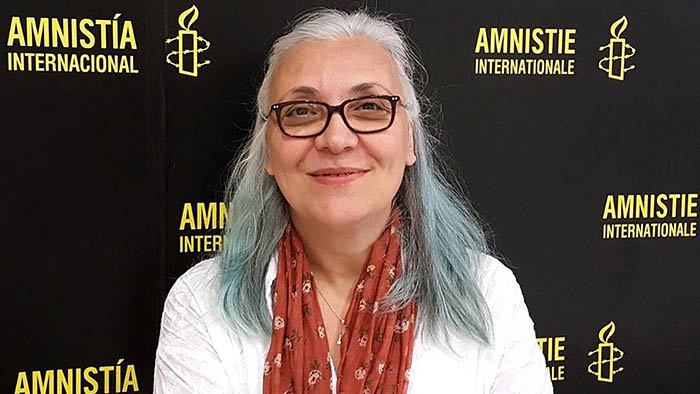
Idil Eser, director of Amnesty International Turkey
Index on Censorship condemns the arrest of Idil Eser, director of Amnesty International Turkey, and demands her immediate and unconditional release, along with that of two digital security trainers and seven human rights defenders. All were arrested during a digital security and information management workshop in Büyükada, Istanbul, on Wednesday afternoon.
“The detention of Idil Eser and other participants in yesterday’s workshop marks a new low in the rapidly decreasing status of human rights in Turkey,” said Melody Patry, head of advocacy at Index on Censorship. “By detaining them incommunicado and denying them access to a lawyer, Turkey shows its complete disregard for the rule of law.”
The whereabouts of Eser and the other detainees are currently unknown. Eser has allegedly been denied access to communication with her lawyer and her family — the latter of which is illegal under Turkish law.
These are just the latest in a string of attacks on civil society. Thousands of journalists and academics have lost their jobs since the coup attempt in July 2016. Turkey is now the world’s top jailer of journalists, with over 160 in jail. Many journalists, including brothers Ahmet Altan and Mehmet Altan, who have been charged with a variety of false and exaggerated claims, await their fate during a trial next month.
Last month, Taner Kiliç, chair of Amnesty International Turkey, and 22 lawyers were unlawfully detained and have yet to be released. In January, three academics who signed a peace petition were also imprisoned.
Take action
Tweet the following from your account:
Dear @RT_Erdogan. We demand the release of Amnesty Turkey Director Idil Eser and her colleagues now! #TurkeyRelease #G20 #TurkeyUncensored[/vc_column_text][/vc_column][/vc_row][vc_row][vc_column][vc_basic_grid post_type=”post” max_items=”4″ element_width=”6″ grid_id=”vc_gid:1499358790272-737dafa5-94ee-6″ taxonomies=”8607″][/vc_column][/vc_row]
06 Jul 17 | Artistic Freedom, Event Reports, News and features

Union Chapel, Islington (Photo: Elina Kansikas for Index on Censorship)
Stand Up For Satire, hosted at the Union Chapel in Islington on Tuesday 4 July, was a night of top comedy in support of Index on Censorship, hosted by Australian stand-up Brendon Burns. The stellar line-up featured comedians Al Murray, Tim Key, Dane Baptiste, Kerry Godliman, Deborah Frances-White, Felicity Ward and Robin Ince, plus a special reading from George Orwell’s Animal Farm by actor and Index patron Simon Callow.
Among the topics poked fun at were North London conformists, the British, the middle class, Brexit, hipsters and your racist nan.
For this special podcast below, Index spoke with Burns, Baptiste, Ince and Murray backstage about the importance of satire and why their craft is uniquely powerful.
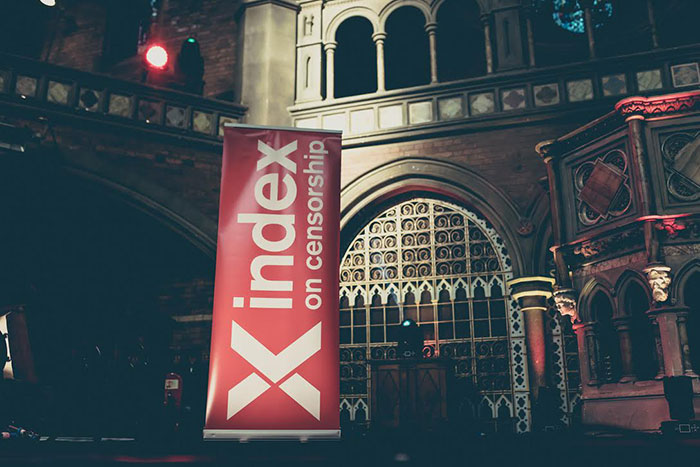
Union Chapel, Islington. (Photo: Elina Kansikas for Index on Censorship)

Union Chapel, Islington. (Photo: Elina Kansikas for Index on Censorship)

Comedian and host Brendon Burns (Photo: Elina Kansikas for Index on Censorship)
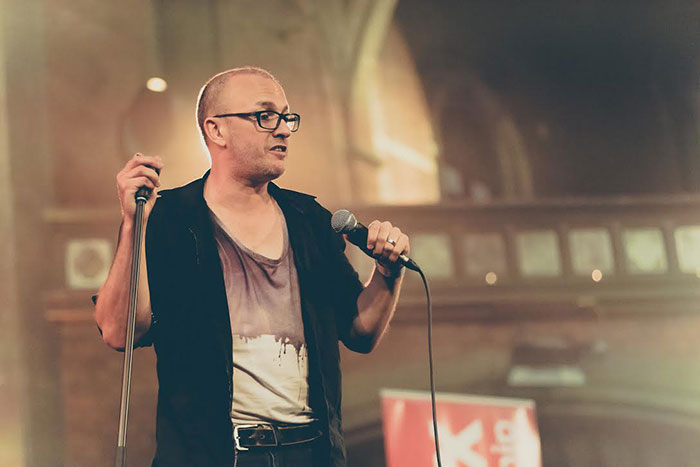
Comedian and host Brendon Burns (Photo: Elina Kansikas for Index on Censorship)

Union Chapel, Islington (Photo: Elina Kansikas for Index on Censorship)

Comedian Tim Key (Photo: Elina Kansikas for Index on Censorship)

Comedian Tim Key (Photo: Elina Kansikas for Index on Censorship)

Comedian Felicity Ward (Photo: Elina Kansikas for Index on Censorship)

Comedian Felicity Ward (Photo: Elina Kansikas for Index on Censorship)

Comedian Felicity Ward (Photo: Elina Kansikas for Index on Censorship)
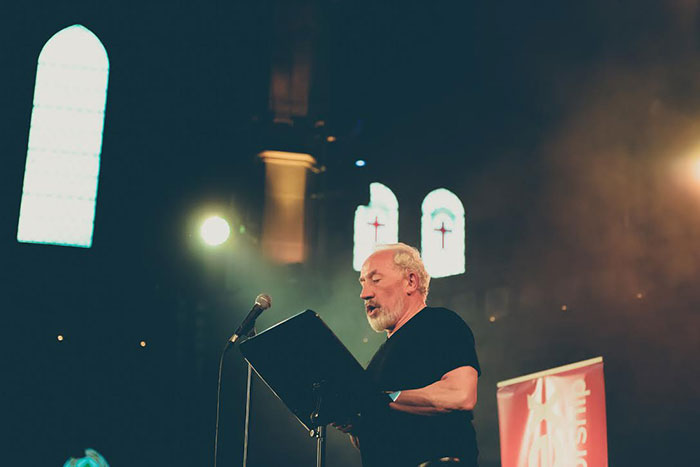
Actor Simon Callow (Photo: Elina Kansikas for Index on Censorship)

Comedian Dane Baptiste (Photo: Elina Kansikas for Index on Censorship)
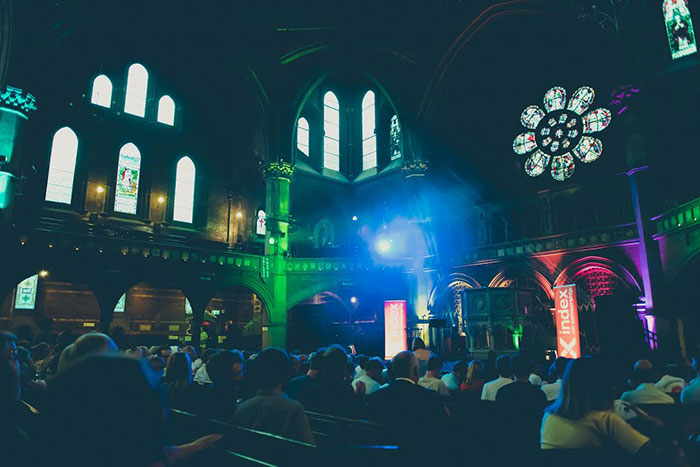
Union Chapel, Islington (Photo: Elina Kansikas for Index on Censorship)

Comedian Deborah Frances-White (Photo: Elina Kansikas for Index on Censorship)

Comedian Deborah Frances-White (Photo: Elina Kansikas for Index on Censorship)

Comedian Kerry Godliman (Photo: Elina Kansikas for Index on Censorship)

Comedian Kerry Godliman (Photo: Elina Kansikas for Index on Censorship)
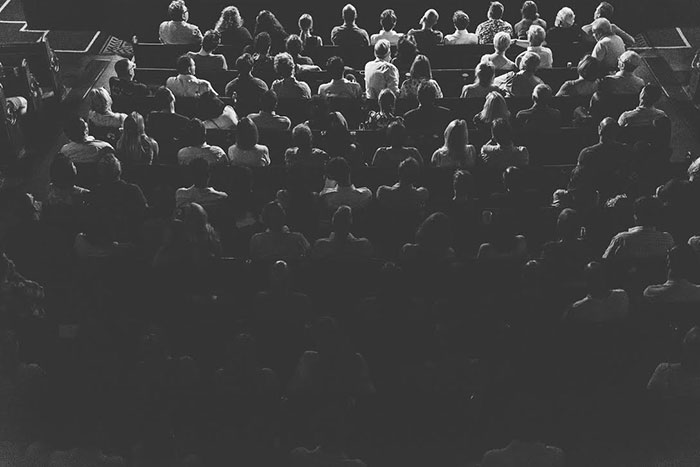
Union Chapel, Islington (Photo: Elina Kansikas for Index on Censorship)

Comedian Robin Ince (Photo: Elina Kansikas for Index on Censorship)

Comedian Al Murray (Photo: Elina Kansikas for Index on Censorship)

Comedian Al Murray (Photo: Elina Kansikas for Index on Censorship)

Comedian Al Murray (Photo: Elina Kansikas for Index on Censorship)
06 Jul 17 | Magazine, News and features, Student Reading Lists, Volume 46.02 Summer 2017 Extras

Mexican journalist Javier Valdez who was recently shot and killed. Credit: Gobierno Cholula/Flickr
For years, Index on Censorship has covered stories of violence against the media in Mexico. In the first six months of 2017, seven journalists have been killed, a terrifying statistic. To help those researching media freedom in Mexico, we have compiled a reading list of articles from the past five years. It includes details of threats, punishments and pressures faced by Mexican journalists. Students and academics whose universities subscribe to Sage Journals will find all these articles free to read.
Making a killing: A special Index investigation looking at why Mexico is an increasingly deadly place to be a journalist as reporters face threats from corrupt police to deadly drug gangs
Vol 46, Issue 3, 2017
Ahead of Mexico’s elections next year, in a special investigation for Index, Duncan Tucker looks at threats to journalists over the past decade.
Read the full article here
Parallel lives and unparalleled risks: The author discusses his time reporting from Mexico, how the death of one journalist particularly affected him and introduces an excerpt from his forthcoming novel
Vol 46, Issue 3, 2017
Mexico is one of the most dangerous countries to be a reporter today, but these dangers are not spread evenly between local and foreign reporters. Author Tim MacGabhann speaks to Jemimah Steinfeld about why this is the backdrop to his new book and introduces an extract from it
Read the full article here
Documenting the truth: Documentaries are all the rage in Mexico, providing a truthful alternative to an often biased media
Vol 47, Issue 3, 2018
Documentaries are growing in popularity in Mexico, and have more freedom to broadcast facts and challenge government lies.
Read the full article here
Between a rock and a hard place: Mexico’s journalists face threats from cartels, the government and even each other
Vol 46, Issue 1, 2017
Alberto Escorcia and Javier Valdez discuss the pressures on Mexican media from all sides: drug cartels, government agencies, and even from other media outlets. These two reporters explain the difficulties journalists face and note that often there is little police protection from cartels. Valdez, a globally known journalist, was shot and killed in May 2017.
Read the full article here
Shooting from the hip: A new mayor in a Mexican border city believes he will make it less dangerous for journalists
Vol 46, Issue 1, 2017
Does local Mexican government have the ability or will to protect journalists? In an interview with Armando Cabada Alvídrez, the mayor of the largest city in Chihuahua (on the border of the United States), and Gabriela Minjares, a co-founder of the Juárez Journalists’ Network, Index on Censorship explores government promises and speculation from journalists on Mexico’s imminent potential for improvement of journalist security.
Read the full article here
Shooting the messengers: Women investigating sex trafficking in Mexico
Vol 45, Issue 2, 2016
Mexican journalists investigating sex trafficking, prostitution or child pornography often encounter threats and pressure not to cover stories. Journalists Lydia Cacho, Sanjuana Martínez and Shaila Rosagel discuss the retaliation they faced for uncovering unsavoury relationships between sex crimes and government officials.
Read the full article here
Mexican airwaves: Interviews with radio journalists who were shut down after investigating presidental property deals
Vol 44, Issue 4, 2015
“The level of violence against Mexican journalists has been well documented, but comparatively little is known about the pressures that reporters and their bosses come under when dealing with the government.” Carmen Aristegui, one of Mexico’s most renowned journalists, lost her job and ability to report in Mexico after uncovering allegations of property fraud against President Peña Nieto.
Read the full article here
Mexican stand-off
Vol 44, Issue 2, 2015
Since the abduction of 43 missing students from Ayotzinapa training college, tensions between Mexico’s academic institutions and government have been at an all time high. In this article, Dr Rossana Reguillo Cruz discusses the case of the missing students, along with the threats she receives on a daily basis after discussing her support for investigations into their disappearance.
Read the full article here
Constitutionally challenged: Mexico’s struggle with state power
Vol 43, Issue 4, 2014
In addition to threats and cover-ups, Mexican journalists face increasing pressure from other directions. While much censorship occurs without regard to the law, this article explores how suppression of speech is becoming further integrated into Mexican society.
Read the full article here
On the ground: In Mexico City
Vol 42, Issue 2, 2013
The Mexican office of Article 19 (the right to freedom of expression), has documented 900 incidents of suppressed expression, aided 100 targeted journalists and received dozens of threats since 2006 (as this article went to press). Ricardo Gonzalez discusses the challenges and progress of the Article 19 office in the face of increasing crime against journalists, and his hope for justice.
Read the full article here
Murder In Mexico
Vol 41, Issue 2, 2012
The Olympic Games frequently draw attention to the social and political conditions of their host countries, stirring up protests from the people and censorship from the government. Brian Glanville, originally a sports reporter sent to cover the 1968 Olympics, recounts his experience of media manipulation and student massacres by the Mexican government during the games, explaining the immense importance of international media coverage when local governments cannot be held accountable.
Read the full article here
06 Jul 17 | Bahrain, Bahrain News, Middle East and North Africa, News and features
[vc_row][vc_column][vc_column_text]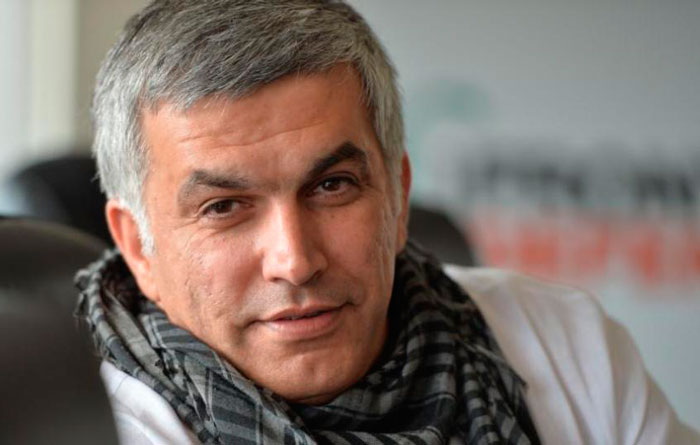
The trial of Bahraini human rights activist Nabeel Rajab has been delayed yet again. He was due to stand trial on Sunday 2 July, but this was postponed until 3 July and again until 10 July.
Rajab, president of the Bahrain Center for Human Rights and Index award winner, was arrested on 13 June 2016 and remains in prison despite a court order to release him on 28 December 2016. He faces four separate legal cases, the trials for two of which have been postponed over 20 times.
“We are particularly concerned about Rajab’s health, which continues to deteriorate due to the poor conditions and mistreatment he receives in prison,” said Melody Patry, head of advocacy at Index on Censorship. On 5 April 2017, Rajab underwent major surgery at a military hospital to remove ulcerated tissue from his lower back. He was returned to his cell at East Riffa Police Station two days later against medical recommendations.
“My father’s fate is unknown. He might end up in a prison cell for the next 18 years, so it’s difficult and tiring for him and for our family,” Rajab’s son Adam Rajab told Index today. “However, that does not mean he will ever stop his struggle for rights and freedom.”
“We all know that my father will be released if he guarantees them that he will be silent, but he will not,” Adam added. “He will always be a voice for the victims of human rights abuses and he will always stand against oppressors and dictators. As he always says ‘I am willing to pay the price for freedom and democracy.'”
Index continues to express concern over the treatment of many human rights defenders in Bahrain including women’s rights activist Ebtisam Al-Sayegh, who this week was arrested following a raid on her home and now risks being tortured. [/vc_column_text][/vc_column][/vc_row][vc_row][vc_column][vc_column_text]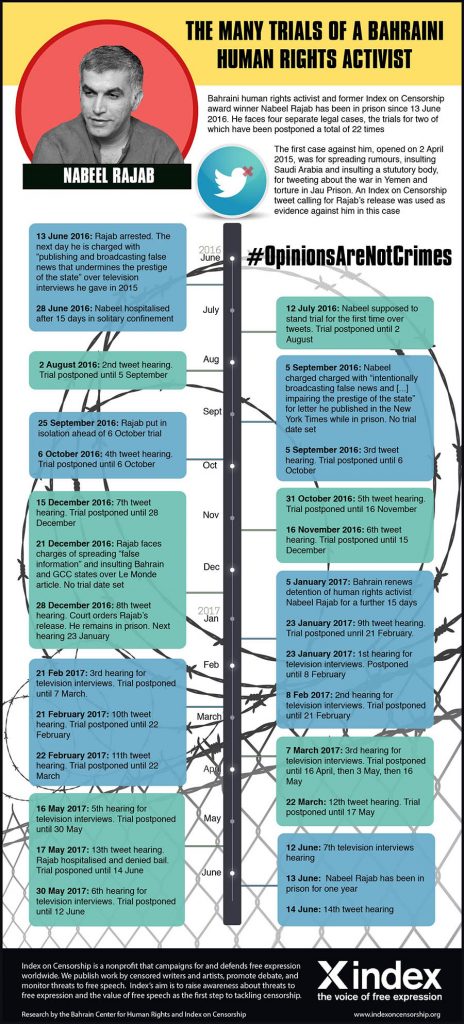 [/vc_column_text][/vc_column][/vc_row][vc_row][vc_column][vc_basic_grid post_type=”post” max_items=”6″ element_width=”6″ grid_id=”vc_gid:1499332927690-0ca55f53-22f9-3″ taxonomies=”3368″][/vc_column][/vc_row]
[/vc_column_text][/vc_column][/vc_row][vc_row][vc_column][vc_basic_grid post_type=”post” max_items=”6″ element_width=”6″ grid_id=”vc_gid:1499332927690-0ca55f53-22f9-3″ taxonomies=”3368″][/vc_column][/vc_row]

































 [/vc_column_text][/vc_column][/vc_row][vc_row][vc_column][vc_basic_grid post_type=”post” max_items=”6″ element_width=”6″ grid_id=”vc_gid:1499332927690-0ca55f53-22f9-3″ taxonomies=”3368″][/vc_column][/vc_row]
[/vc_column_text][/vc_column][/vc_row][vc_row][vc_column][vc_basic_grid post_type=”post” max_items=”6″ element_width=”6″ grid_id=”vc_gid:1499332927690-0ca55f53-22f9-3″ taxonomies=”3368″][/vc_column][/vc_row]